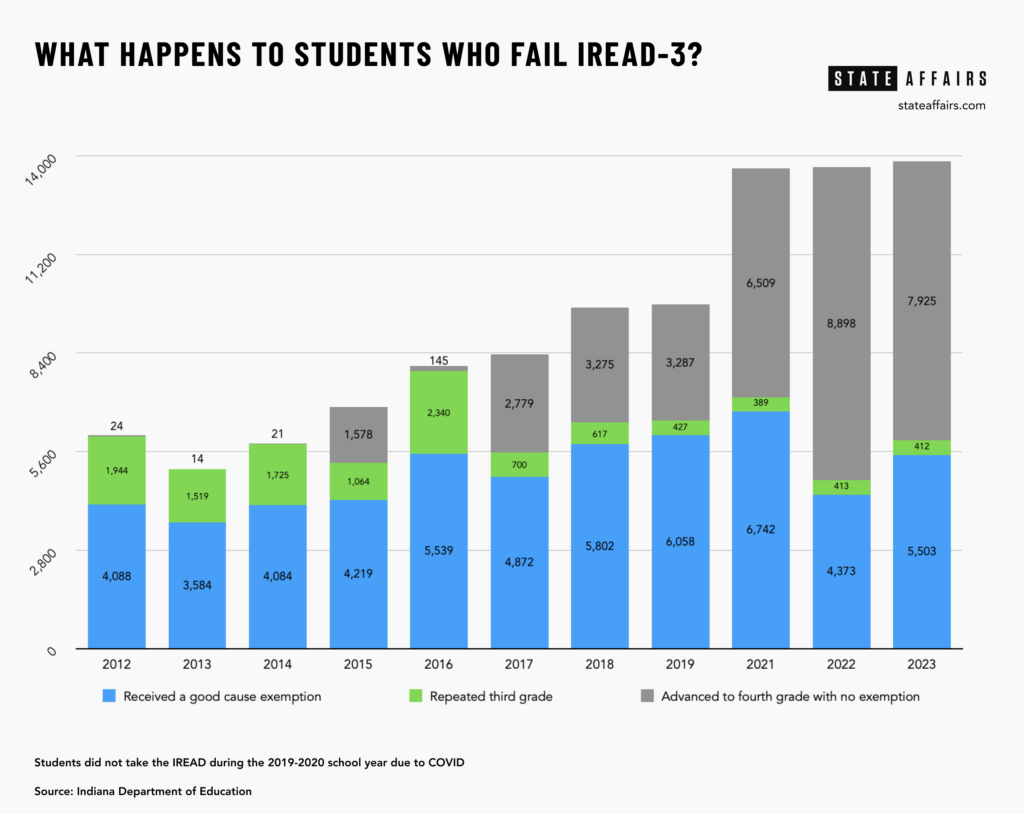Stay ahead of the curve as a political insider with deep policy analysis, daily briefings and policy-shaping tools.
Request a DemoIndiana governor signs legislation to hold back more third graders. Here’s who it could impact.

(Credit: Getty Images Signature)
[Editor: The legislation for this proposal, Senate Bill 1, won approval from the General Assembly, and Gov. Eric Holcomb signed it into law March 11.
Gist
The Indiana Senate approved a bill Tuesday that could lead to thousands of more Hoosier third graders getting held back each year.
Under Senate Bill 1, a priority of both Senate Republican leadership and Gov. Eric Holcomb, schools would be required to hold back third graders who fail the state reading test unless they qualify for a narrowly-tailored exception.
The goal of Senate Bill 1, which also contains a number of more proactive measures, is to make sure all students learn how to read. In 2023, nearly one in five third graders failed the IREAD-3 test.
“While some would say retention isn’t good for a child, let’s think about this,” said bill author Sen. Linda Rogers. “What isn’t good is to move that student on without foundational reading skills.”
The bill passed out of the Senate by a 36-13 vote with four Republicans joining Democrats in opposing the bill.
What Senate Bill 1 does
Rogers, a Republican from Granger, has repeatedly emphasized that her goal is not to simply hold back more students. To her point, Senate Bill 1 does do a lot more than just strengthen retention rules, but the portion of the bill about which students to hold back has been the most controversial.
Senate Bill 1 would require schools to offer the IREAD test starting in second grade, something a majority of Indiana schools already do. Students who fail would still have to take the test in third grade as well, and would have another chance the following summer if they fail again.
That means students would have three tries to pass the test before any retention measures kicked in.
Schools also would be required to offer summer school to students in second and third grade who are not proficient in reading, but students wouldn’t be required to participate.
If none of those measures work, and a student still continues to fail the IREAD test, starting in 2025 schools would be required to hold them back unless they qualified for a “good cause exemption,” such as most English-Language Learner students, those enrolled in special education or those who have already repeated third grade.
“This is not a retention bill,” Rogers said on the Senate floor. “Retention is the absolute last resort after we have exhausted all other methods to help struggling readers.”
Rogers’ bill would add a new exception for students who fail the IREAD test but pass the third grade math exam, which would have enabled 583 students to qualify for an exception had SB 1 been in place for the 2023 school year. Most of the students who fail IREAD are also failing the math test.

According to the latest legislative fiscal analysis of the bill, an estimated additional 6,300 students could be held back in 2026 due to the change — or 16 times the number that were held back in 2023. Of the nearly 14,000 third graders who failed the IREAD test in 2023, some 400 students had to retake third grade.
Rogers is optimistic the actual numbers of students who would have to retake third grade will be much lower than estimated due to the amount of other more proactive approaches implemented under the bill.
But some people and groups have concerns about the retention piece of the bill.
During a committee hearing, Rachel Burke, a mom and former president of the Indiana Parent Teacher Association, warned the retention policies would have negatively impacted her own daughter, who failed the IREAD test in third grade after struggling with epilepsy.
Her daughter was never held back and Burke said her daughter is now in 11th grade and ranked No. 4 out of 820 students.
“Painting with broad strokes is dangerous,” Burke said. “It was apparently obvious to the educators surrounding my daughter that she just needed more time, and that time didn’t need to still be in third grade.”
Does holding back students help or hurt them?
Retention is a controversial concept in part because studies on its impact show mixed results.
A study on the impact of Indiana’s 2012-2017 retention policy found that those students who didn’t pass the IREAD and repeated third grade performed better in math and English language achievement in fourth grade than their peers with similar IREAD scores.
Other studies on similar policies in Florida, Mississippi and Chicago came to similar conclusions about the academic benefits of holding back a student in grade school.
The Indiana study, though, did not follow the students into high school, so the long-term impact on holding young students back is less clear. One 2017 Texas study found that grade school retention increased the odds of a student dropping out in high school.
Data on non-academic outcomes for grade-level retention is even murkier. The Indiana study found no statistical evidence that holding back students adversely impacted their attendance or led to more disciplinary problems. But a separate study on Florida’s policy found disciplinary issues increased among third graders that had to repeat the grade.
Vince Edwards, the principal at Fortville Elementary School, completed his doctoral dissertation at Ball State University on test-based retention policies and is regularly involved in conversations about whether to hold students back.
So he knows the pros and cons well. He thinks the current policy — which largely gives teachers, schools and parents discretion over who to advance as long as those who fail the reading test continue to receive third grade reading instruction — is a better approach than requiring across-the-board retention.
“I think it’s a legitimate intervention,” Edwards said during committee testimony on the bill, “but I also think it’s an intervention that needs to be used very sparingly and in specific cases.”
Sen. Eric Bassler, R-Washington, was one of four Republicans to vote against the bill on the Senate floor. He told the story of how he didn’t learn to read until 5th grade — and wasn’t held back — but still got the help he needed.
“That’s the thing that gives me pause is does [holding back students] have a stigma on young people that we could address in some other way?” Bassler asked.
What’s next?
The bill now moves to the House, which will likely be receptive to the legislation.
House Republicans included in their list of priorities a plan to “support efforts to make Indiana the No. 1 state in the nation for third grade reading proficiency by 2027.”
All bills will have to be finalized by mid-March when lawmakers are required to wrap up the legislative session.
Update: The legislation for this proposal, Senate Bill 1, won approval from the General Assembly, and Gov. Eric Holcomb signed it into law March 11.
Contact Kaitlin Lange on X @kaitlin_lange or email her at [email protected].
Facebook @stateaffairsin
Instagram @stateaffairsin
LinkedIn @stateaffairs
4 things to know about Braun’s property tax proposal
Sen. Mike Braun, the Republican candidate for Indiana’s governor, released a plan for overhauling property taxes Friday morning that would impact millions of Hoosiers, Indiana schools and local governments. “Nothing is more important than ensuring Hoosiers can afford to live in their homes without being overburdened by rising property taxes driven by rapid inflation in …
Bureau of Motor Vehicles looks to add new rules to Indiana’s driving test
The Bureau of Motor Vehicles wants to amend Indiana’s driving skills test, putting “existing practice” into administrative rule. Indiana already fails drivers who speed, disobey traffic signals and don’t wear a seatbelt, among other violations. Yet the BMV is looking to make the state’s driving skills test more stringent. A proposed rule amendment looks to …
In Indianapolis, Harris says she’s fighting for America’s future
Vice President Kamala Harris, the presumptive Democratic presidential nominee, told a gathering of women of color in Indianapolis on Wednesday that she is fighting for America’s future. She contrasted her vision with another — one she said is “focused on the past.” “Across our nation, we are witnessing a full-on assault on hard-fought, hard-won freedoms …
Indiana Black Legislative Caucus endorses Harris, pledges future support
The Indiana Black Legislative Caucus unanimously voted Wednesday to endorse Vice President Kamala Harris’ presidential run and will look at ways to assist her candidacy, the caucus chair, state Rep. Earl Harris Jr., D-East Chicago, told State Affairs. The caucus is made up of 14 members of the Indiana General Assembly, all of whom are …




